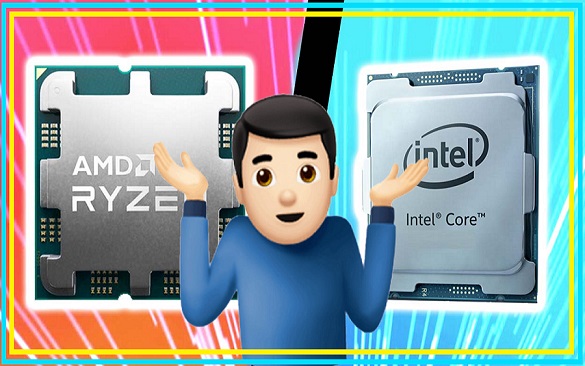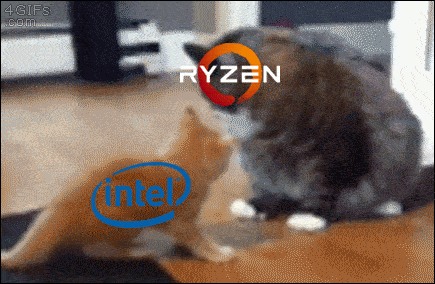Pros and Cons of the Latest AMD and Intel CPUs
A Battle of the CPU Titans
Introduction
The eternal competition between AMD and Intel in the world of computer central processing units (CPUs) continues to drive innovation and provide consumers with more choices than ever before. Both companies consistently release new generations of CPUs, each claiming superiority in various aspects. In this article, we'll explore the pros and cons of the latest offerings from AMD and Intel, shedding light on their respective strengths and weaknesses.

AMD Ryzen 5000 Series
Pros:
- Exceptional Multithreaded Performance: AMD's Ryzen 5000 series, powered by the Zen 3 architecture, excels in multithreaded tasks. With more cores and threads, they are well-suited for content creation, video editing, and 3D rendering.
- Impressive Gaming Performance: Ryzen 5000 CPUs have closed the gaming performance gap with Intel, making them a preferred choice for gamers and their desktops. They offer high clock speeds and low latency, resulting in smoother gameplay for those into the high-end computer games.
- Efficiency and Performance-Per-Watt: AMD's 7nm process technology has led to CPUs that offer competitive performance while being energy-efficient, which is crucial for laptops and desktops alike. Not only saving you money on your power bill but more importantly, for those interested in high power computing, more CPU power achieved more efficiently.
- PCIe 4.0 Support: AMD's latest CPUs support PCIe 4.0, doubling the bandwidth compared to PCIe 3.0. This is beneficial for future-proofing as well as faster storage and graphics.
Cons:
- Limited Availability: Demand often outpaces supply for AMD CPUs, making them harder to find at times, and prices may be inflated due to high demand. It’s not unusual for computer suppliers to have no stock of various models of CPU thus limiting your options.
- Compatibility: While AMD has made strides in compatibility, Intel still leads in this area. Some software and applications may not be optimized for AMD CPUs. There is often comment on the stability of the desktop computers using AMD for this reason.
- Integrated Graphics: Most Ryzen processors lack integrated graphics, so you'll need a dedicated GPU for display. But for most high spec computer users this is not a problem as they planned on adding a specialised graphics card anyway. That said, it can be useful to have onboard graphics as a standby option.
Intel 11th Gen Core Processors
Pros:
- Strong Single-Core Performance: Intel's 11th Gen Core processors, like the Core i9-11900K, offer excellent single-core performance, which is crucial for tasks that rely on high clock speeds, such as gaming, CAD, graphics or movie & music editing.
- QuickSync Video: QuickSync is a specialised hardware acceleration technology developed by Intel for video encoding and decoding tasks. Integrated into many Intel processors, QuickSync harnesses the power of dedicated hardware blocks to significantly enhance video processing performance. It allows for faster and more efficient transcoding of video content, making it an invaluable feature for tasks like video editing, streaming, and video conferencing. QuickSync's advantage lies in its ability to offload these resource-intensive operations from the CPU cores, reducing the strain on the processor and improving overall system responsiveness. This technology is especially beneficial for content creators and multimedia enthusiasts, as it accelerates video-related tasks while maintaining high-quality output.
- Wide Availability: Intel CPUs are widely available, and there is a vast ecosystem of motherboards and compatible components. Though in recent years there have been supply issues, generally Intel CPUs are readily available.
- Integrated Graphics: Many Intel processors come with integrated graphics, which can be a cost-effective solution for systems that don't require discrete GPUs. Handy for home and office computers as well as a standby option if you have trouble with your dedicated graphics card.
Cons:
- Multithreaded Performance: In the multithreaded performance department, Intel's 11th Gen processors often lag behind AMD's Ryzen 5000 series due to fewer cores and threads. Some think they are more efficient but it’s hard to beat the numbers.
- Power Efficiency: Intel's 14nm process technology in the 11th Gen processors can consume more power and generate more heat than AMD's 7nm chips, leading to potential thermal issues. More power used costs more but also leads to inefficiencies in the CPU itself leading to lesser performance.
- PCIe 3.0: While PCIe 4.0 is supported by some Intel CPUs, most still use PCIe 3.0, limiting the bandwidth for high-speed SSDs and GPUs. The advantage of PCIe 4.0 over PCIe 3.0 lies in its significantly increased data transfer speeds. PCIe 4.0 doubles the maximum theoretical bandwidth per lane compared to PCIe 3.0, delivering a whopping 16 gigatransfers per second (GT/s) per lane. This translates to higher data throughput for compatible devices like graphics cards and SSDs. With PCIe 4.0, devices can achieve faster read and write speeds, reducing data transfer bottlenecks and significantly improving overall system performance. It's especially beneficial for demanding tasks like gaming, 4K video editing, and data-intensive applications, where rapid data access and transfer are essential for a smoother user experience.

Conclusion
The choice between AMD and Intel CPUs ultimately depends on your specific needs and priorities. AMD's Ryzen 5000 series excels in multithreaded tasks and offers excellent gaming performance. In contrast, Intel's 11th Gen Core processors shine in single-core performance and come with integrated graphics, making them suitable for a broad range of applications. Often, simple available may be the primary factor.
If you need advice on which CPU to get for your computer, please call our experienced and skilled technicians. We’re near you – right here in Christchurch.
Consider factors such as your budget, intended use (gaming, content creation, general computing), and compatibility with other components when making your decision. As technology continues to advance, both AMD and Intel are likely to keep pushing the envelope, offering increasingly impressive CPUs to meet the demands of modern computing.
Friendly Advice in Plain English.
CALL - 0800 FIX NOW
Here's some further links to new PC info
https://www.geeksonwheels.co.nz/buying-guide/gaming-essentials-2023/
https://hardwired.pbtech.co.nz/article/677/pc-buying-guide

